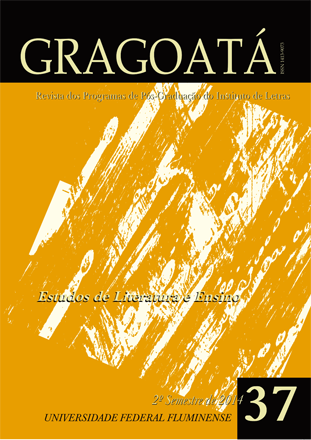THE TYPOLOGY OF LITERATURE ISSUES IN THE NATIONAL SECONDARY EDUCATION EXAMINATION (ENEM) AND ITS CONSEQUENCES FOR LITERATURE TEACHING
DOI:
https://doi.org/10.22409/gragoata.v19i37.33001Keywords:
literature teaching in Brazil, Brazilian National Secondary Education Examination, readers developmentAbstract
This article discusses the crisis which threatens the “right to literature” (expression used by Antonio Candido, a renowned theoretician in Brazilian Literature) in schools regarding the process of devaluing literature as a school subject. In later years, there is a growing tendency to an imposition of Enem (Brazilian Portuguese acronym that stands for Exame Nacional do Ensino Médio; in English, National Secondary Education Examination) as the virtually sole admission test for enrollment in universities in Brazil. Questions about literature extracted from Enem tests from 1998 to 2013 were subject to quantitative and qualitative analyzes. The data show a tendency to be countered: the gradual loss of ground of the subject in the admission exam – and, as a consequence, in school curricula –, as well as the neglecting of the literary text specificities and the overvaluation of functional reading, inter alia. Finally, this article analyzes the consequences of the adoption of Enem as a national college admission exam, and adopts a standpoint which privileges cultural reading (to the detriment of a functional approach to the literary text) and the values implied in the dissemination of the literary tradition (according to concepts by Assumção, Candido, Colomer, Giardinelli, and others).
Downloads
Downloads
Published
How to Cite
Issue
Section
License
Authors who publish in Gragoatá agree to the following terms:
The authors retain the rights and give the journal the right to the first publication, simultaneously subject to a Creative Commons license CC-BY-NC 4.0, which allows sharing by third parties with due mention to the author and the first publication by Gragoatá.
Authors may enter into additional and separate contractual arrangements for the non-exclusive distribution of the published version of the work (for example, posting it in an institutional repository or publishing it in a book), with recognition of its initial publication in Gragoatá.

Gragoatá is licensed under a Creative Commons - Attribution-NonCommercial 4.0 International.














